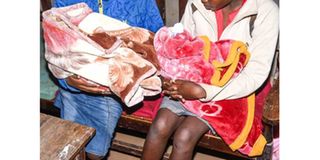Report: Cruel remarks hindering teen mums’ return to school

Teen mothers.
What you need to know:
- In Machakos, one participant said “pregnant girls are a bad influence on the rest of the students and I would not allow my daughter to sit in class with someone pregnant; it is like putting a rotten tomato together with good ones."
- In Kajiado, one teacher told her students that on matters of sex, "they should consult with a teenage mother, who was supposedly 'an expert in sexuality matters’, despite the fact that she was a victim of rape."
- Findings based on a baseline survey conducted in Narok, Nairobi, Machakos, Nakuru and Kajiado under the Tamatisha project.
Insensitive remarks by teachers and stigma from community are among the top factors undermining re-entry of teenage mothers to school.
This is according to a report of a baseline survey conducted by the Forum for African Women Educationalists in Kenya (Fawe-K) in Narok, Nairobi, Machakos, Nakuru and Kajiado under its two-year Tamatisha project.
"In Kajiado, one teacher told her students that on matters of sex, they should consult with a teenage mother, who was supposedly 'an expert in sexuality matters’, despite the fact that she was a victim of rape," states the report.
In a focus group discussion in Machakos, one participant said “pregnant girls are a bad influence on the rest of the students and I would not allow my daughter to sit in class with someone pregnant; it is like putting a rotten tomato together with good ones."
Fawe-K validated the report at Waridi Paradise Hotel in Nairobi. The ceremony brought together education stakeholders from the five counties identified as having high prevalence of teenage pregnancies.
Kawira Gikambi, Ministry of Education’s director of Policy, Partnership and East African Community Affairs, stated that data derived from the report would be used to inform strategies to mitigate teenage pregnancies and enforce reentry policies.
"We will be keen on county-specific statistics and causal factors for teenage pregnancies to be able to analyse and compare them to the national factors such as gender-based violence, defilement and substance abuse outlined in National Education Sector Strategic Plan (NESSP) 2018-22," she said.
Ms Kigambi said the report came at an opportune time when they were planning to review NESSP, which underscores the importance of gender mainstreaming at all education levels.
She asserted that education policies, backed by data, are needed to reduce prevalence of teenage pregnancies, citing a gap in statistics relating to girls living with disabilities.
Ministry of Education Gender officer Stephen Jalenga, who heads youth and gender mainstreaming, noted that girls in slums, refugee camps, and those living with disabilities are at the highest risk of becoming teenage mothers.
Mr Jalenga added that youth-friendly services, peer education, counselling and life skills training are some approaches that can be employed to combat teenage pregnancies. He urged stakeholders to offer learners psychosocial support to enable them to return to school.





